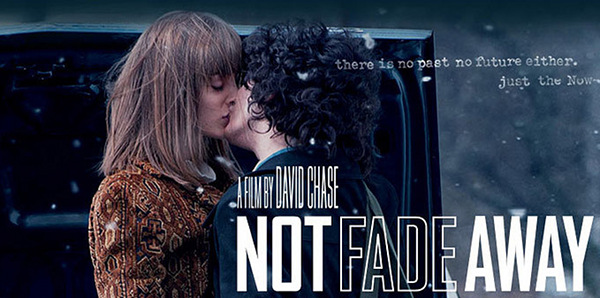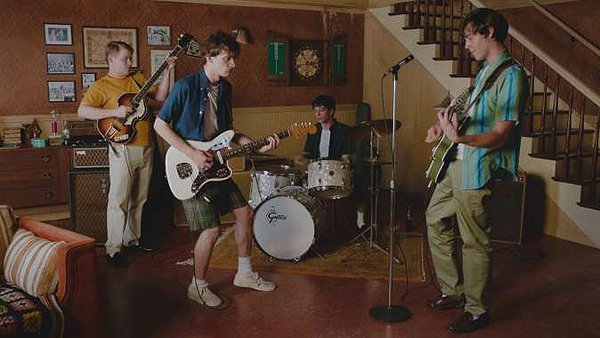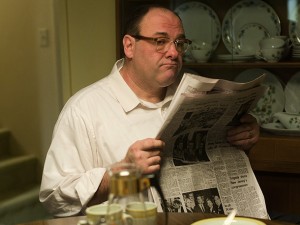
Narratively speaking, Not Fade Away is the perfect title for David Chase’s directorial debut. Named after a 1957 Buddy Holly song (which he released under the name Charles Hardin) that was later immortalized with a ’64 cover by the Stones, it’s a fitting designation for a film about a band that can’t seem to break away from the footsteps of their predecessors. Chase’s latest work is intelligently crafted and layered with a fair amount of reverence for the canvas he’s painting on, but his inability to crack his own story thematically makes Not Fade Away a film that sort of does (fade away, that is).
Let’s not pretend like Chase is a stranger to filmmaking, having shepherded his own creation, The Sopranos, through 86 hours of programming. Yet the problems that plagued that show are evident in Chase’s first film. Like Sopranos, you’re left acknowledging a certain amount of brilliance while remarking just how confused and distracted Chase allows himself to get for stretches.
For every Rolling Stones-type success story, there are a thousand never-weres: bands that tried and failed to put their artistic stamp on the popular culture. Not Fade Away is about the never-weres, as a newly formed New Jersey group struggles to make it big while juggling artistic conflict, familial strife, and volatile relationships with muses. In that sense, Chase’s film is something of a shattered mirror as he gives every shard attention, never managing to piece the whole into a cohesive reflection of the message.
At the heart of the film is Doug, played with coolly collected, Dylan-esque swagger by Joe Magaro. His transformation from shy drummer to charismatically sexual frontman is a joy to watch, and Magaro brings effective command and genuine vocal talent to the role.

For as rich a character as he is, Douglas is stretched thin across too many subplots. There’s his on-again off-again romance with Grace (Bella Heathcote), his tumultuous relationship with his unaccepting father (James Gandolfini) and his interpersonal conflicts with members of the band. This in addition to other subplots involving Bella’s sister’s mental collapse as well as Douglas’ sister’s coming of age.
Chase tries to view all of it through the lens of the musical revolution of the time but, aside from a stellar soundtrack, his efforts never amount to greatness even if his performers do. Heathcote cements herself as an actress to watch in the coming years, as her Grace manages to be both loathsome and identifiable. The more we learn the more broken she becomes, even as she holds all the cards in her relationship with Doug. Meanwhile, Will Brill and Jack Huston are both fantastic as members of the band, their own misgivings and ill-conceived ambitions injecting levity throughout.
 James Gandolfini, reuniting with Chase for the first time since Sopranos, disappoints as Douglas’ father. There’s nothing inherently wrong with the performance, just that it’s too familiar for anyone who’s seen the gifted actor as Tony Soprano. Gandolfini is too talented a performer with too many tricks up his sleeve to need to go to that well but, whether it is the Jersey accent or intimidating physicality of the role, there’s too much Soprano here. Concurrently, Chase has more to say about Italian America, again featuring the culture prominently throughout and framed in dinner sequences that again mirror the critically acclaimed show.
James Gandolfini, reuniting with Chase for the first time since Sopranos, disappoints as Douglas’ father. There’s nothing inherently wrong with the performance, just that it’s too familiar for anyone who’s seen the gifted actor as Tony Soprano. Gandolfini is too talented a performer with too many tricks up his sleeve to need to go to that well but, whether it is the Jersey accent or intimidating physicality of the role, there’s too much Soprano here. Concurrently, Chase has more to say about Italian America, again featuring the culture prominently throughout and framed in dinner sequences that again mirror the critically acclaimed show.
The film almost works as a window into the times, as the band’s story is an interesting one drenched in a musical style we see too little of. But Chase again takes a detour from this notion, as the last moments of the film fizzle away before a send-off that’s so WTF, so outrageous and out-there that you almost have to love it if it weren’t so god-awful. In an attempt to explain away the narration throughout the film, Chase features a scene with one of his actors looking directly into the camera listing some (not all) of the film’s themes before literally dancing into the credits. It’s an artsy wink in an otherwise restrained work, one that serves little purpose and works against the messages of the film. It’s an ugly note to end on.
Not Fade Away is compelling in spurts. Like a song without a hook, it never comes together. Chase is used to storytelling that spreads far and wide, and at times Not Fade Away feels like a TV show that’s missing entire episodes. There are entire spans of time and events that are missing completely. Still, I enjoyed the film not for what it was, but for its ambition and potential. It becomes clear that Chase has a great movie in him somewhere, even if this isn’t it.
A weak opening act, as it were. Though the concert’s likely not over.
Rating: 




Out of a Possible 5 Stars